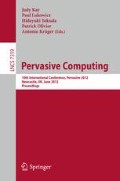Abstract
In developing regions, the reach of crowdsourcing services such as Amazon Mechanical Turk (mTurk) has been limited by the lack of adequate payment mechanisms and low visibility amongst the crowd. In this paper, we present a commodity based model for crowdsourcing where crowd workers get paid in kind in the form of a commodity instead of money. Our model makes crowdsourcing services more visible to users in developing regions and also addresses the issue of payment. We conducted two field studies in urban India to evaluate the applicability of our proposed model. Our results show that the commodity based crowdsourcing model reached workers with very different demographics from the typical mTurk workers. We also found that users preferred to receive a commodity instead of money as remuneration.
Access this chapter
Tax calculation will be finalised at checkout
Purchases are for personal use only
Preview
Unable to display preview. Download preview PDF.
References
Alt, F., Shirazi, A.S., Schmidt, A., Kramer, U., Nawax, Z.: Location-based Crowdsourcing: Extending Crowdsourcing to the Real World. In: ACM Nordic Conference on Human Computer Interactions, Reykjavik, IC (October 2010)
Frei, B.: Paid Crowdsourcing: Current State & Progress towards Mainstream Business Use. Smartsheet White Paper (September 2009)
BCG Report: The Internet’s new Billion: Digital Consumers in Brazil, Russia, India, China and Indonesia (September 2010)
Eagle, N.: txteagle: Mobile Crowdsourcing. In: Aykin, N. (ed.) IDGD 2009. LNCS, vol. 5623, pp. 447–456. Springer, Heidelberg (2009)
Khanna, S., Ratan, S., Davis, J., Thies, W.: Evaluating and Improving the Usability of Mechanical Turk for Low-Income Workers in India. In: Symposium on Computing for Development, DEV (2010)
MobileWorks, http://www.mobileworks.com/
Okolloh, O.: Ushahidi or ’testimony’: Web 2.0 tools for crowdsourcing crisis information. Participatory Learning and Action (59) (2009)
Reserve Bank of India: Report on trend and banking in India (October 2009), http://rbidocs.rbi.org.in/rdocs/Publications/PDFs/RTP081110FL.pdf
reCAPTCHA, http://www.google.com/recaptcha
Reddy, S., Estrin, D., Srivastava, M.: Recruitment Framework for Participatory Sensing Data Collections. In: Floréen, P., Krüger, A., Spasojevic, M. (eds.) Pervasive Computing. LNCS, vol. 6030, pp. 138–155. Springer, Heidelberg (2010)
Ross, J., Irani, L., Silberman, M.S., Zaldivar, A., Tomlinson, B.: Who are the crowdworkers?: shifting demographics in mechanical turk. In: CHI 2010, Atlanta, Georgia, USA, April 10-15 (2010)
Samasource website, http://www.samasource.org/
TeamLease Services. Indian Labour Report 2007: The Youth Unemployability Crisis (2007), http://www.teamlease.com/images/reports/Teamlease_LabourReport_2007.pdf
Telecom Regulatory Authority of India (TRAI), http://www.trai.gov.in/Default.asp
Willett, W., Aoki, P., Kumar, N., Subramanian, S., Woodruff, A.: Common Sense Community: Scaffolding Mobile Sensing and Analysis for Novice Users. In: Floréen, P., Krüger, A., Spasojevic, M. (eds.) Pervasive Computing. LNCS, vol. 6030, pp. 301–318. Springer, Heidelberg (2010)
Yan, T., Kumar, V., Ganesan, D.: Crowdsearch: Exploiting Crowds for Accurate Real-Time Image Search on Mobile Phones. In: ACM Mobisys, San Francisco, CA (2010)
Kube, S., Maréchal, M.A., Puppe, C.: The Currency of Reciprocity - Gift-Exchange in the Workplace. Institute of Empirical Research in Economics, University of Zurich (July 2008)
Kurosaki, T.: Wages in Kind and Economic Development: Their Impacts on Labor Supply and Food Security of Rural Households in Developing Countries. Institute of Economic Research, Hitotsubashi University (2008)
Gupta, A., Thies, W., Cutrell, E., Balakrishnan, R.: mClerk: Enabling Mobile Crowdsourcing in Developing Regions. In: CHI 2012, Austin, Texas, US, May 5-10 (2012)
Author information
Authors and Affiliations
Editor information
Editors and Affiliations
Rights and permissions
Copyright information
© 2012 Springer-Verlag Berlin Heidelberg
About this paper
Cite this paper
Samdaria, N., Mathur, A., Balakrishnan, R. (2012). Paying in Kind for Crowdsourced Work in Developing Regions. In: Kay, J., Lukowicz, P., Tokuda, H., Olivier, P., Krüger, A. (eds) Pervasive Computing. Pervasive 2012. Lecture Notes in Computer Science, vol 7319. Springer, Berlin, Heidelberg. https://doi.org/10.1007/978-3-642-31205-2_21
Download citation
DOI: https://doi.org/10.1007/978-3-642-31205-2_21
Publisher Name: Springer, Berlin, Heidelberg
Print ISBN: 978-3-642-31204-5
Online ISBN: 978-3-642-31205-2
eBook Packages: Computer ScienceComputer Science (R0)

